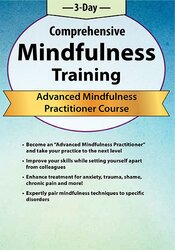

You know how important it is for clients to have confidence in their clinician – to know the comfort of working with someone who’s invested extra time and effort to build the necessary skills to provide treatment at the highest level.
But standing out from the crowd can be tough. When clients have so many options, how do you differentiate yourself from your colleagues?
Watch this recording and dramatically improve your mindfulness skills for enhanced treatment of anxiety, trauma, shame, depression, addiction, chronic pain and more!
Get answers to your questions on organizing and leading a mindfulness practice with clients, learn to effectively use numerous core and advanced mindfulness skills and exercises, and get detailed instruction on incorporating them into treatment with plans for pairing them with the specific mental health disorders you see in your office each day.
This online program is worth 19 hours CPD.
| File type | File name | Number of pages | |
|---|---|---|---|
| Manual - 3-Day Comprehensive Mindfulness Training: Advanced Mindfulness Practitioner Course (17.3 MB) | 99 Pages | Available after Purchase |

Rochelle Calvert (Voth), Ph.D., CMT, SEP, BCBA, is the founder of New Mindful Life. She has studied mindfulness for the past 16 years and has taught classes, courses, workshops and retreats. Rochelle leads classes/courses/seminars in Six-week Introductory Training in Mindfulness, (S.I.T.), Awake in the Wild- Nature-Based Mindfulness retreats, Mindfulness-Based Stress Reduction (MBSR), Mindfulness Based Cognitive Therapy (MBCT), Mindfulness Based Eating, Mindful Parenting and Mindful Workplace. She also facilitates professional trainings in mindfulness for clinicians and travels the country teaching seminars for PESI. She also works as clinical psychologist in private practice in San Diego.
Rochelle offers mindfulness, nature-based therapy and somatic experiencing as a psychologist with New Mindful Life. Her therapeutic approach includes teaching people individual mindfulness meditations - both indoors and outdoors - specific to their unique concerns to support healing. She also integrates somatic experiencing healing (body-based healing through nervous system reorganization) with the mindfulness and nature-based meditation practices. Rochelle has therapeutic specialty areas of training to support integration of these services to individuals struggling with life transitions, depression, anxiety, PTSD, pain conditions, eating disorders, as well as families of developmentally delayed children/adults.
Speaker Disclosures:
Satisfaction Guarantee
Your satisfaction is our goal and our guarantee. Concerns should be addressed to info@pesi.co.uk or call 01235847393.
Please wait ...